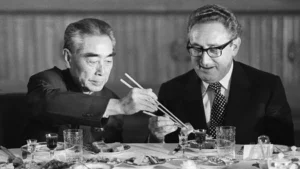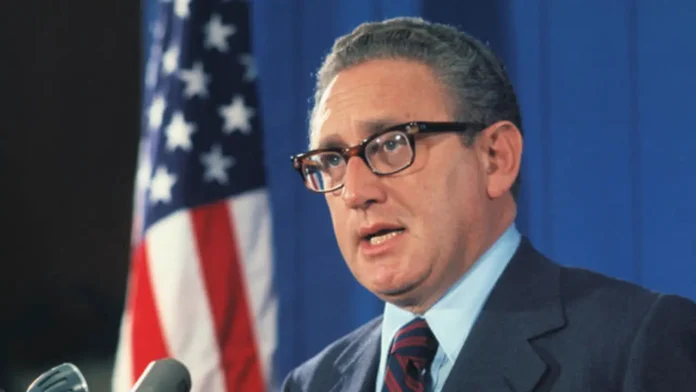During the Nixon and Ford administrations, he was the United States’ principal diplomat and national security advisor.
He left government in the middle of the 1970s, but generations of leaders continued to consult him for decades afterward.
The Connecticut-based former diplomat, who was born in Germany, passed away.
Because of his Realpolitik approach, Kissinger became a divisive figure; during their bombing campaign in Cambodia alongside President Richard Nixon, some accused him of war crimes.
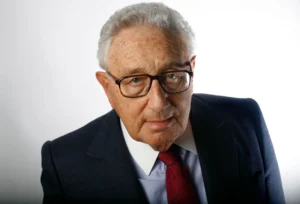
Leading the tributes was former US President George W. Bush, who declared that the country had “lost one of the most dependable and distinctive voices on foreign affairs”.
Tony Blair, the former prime minister of the United Kingdom, called Kissinger an artist of diplomacy and stated that his motivation stemmed from “a genuine love of the free world and the need to protect it”.
Tricia Nixon Cox and Julie Nixon Eisenhower, the daughters of President Richard Nixon, praised Henry Kissinger’s life narrative as “so unique – and so thoroughly American”.
The statement said that Henry Kissinger “will long be remembered for his many achievements in advancing the cause of peace.” “But it was his character that we will never forget.”
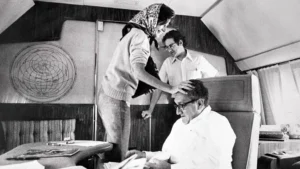
The school teacher’s son was born in Germany in 1923, but he didn’t come to the US until 1938 when he and his family fled the Nazis. His accent from his native Bavaria never really left.
After obtaining US citizenship in 1943, he served in the US Army for three years before joining the Counter Intelligence Corps.
He taught international relations at Harvard after obtaining a PhD, a master’s degree, and a bachelor’s degree.
He was appointed national security adviser by then-President Nixon in 1969, a post that gave him significant influence over US foreign policy.
During his eight years as secretary of state and national security adviser (1969–1977), the United States of America ultimately withdrew from the Vietnam War. Additionally, it led to the normalization of relations with China and the end of hostilities between Israel Egypt, and Syria during the Yom Kippur War of 1973 in the Middle East.
The concept of shuttle diplomacy, in which a mediator moves between opposing parties to assist them in reaching a settlement, was born out of this endeavor.
News of Kissinger’s passing quickly became popular on the social media site Weibo in China, where he had long-lasting fame.
He was described as “an old friend of the Chinese people” in China News’ obituary, and he was referred to as “a legendary diplomat” by China Central Television, who further noted his significant contribution to US-China relations.
But over time, Kissinger also faced harsh criticism from those who said he supported oppressive regimes all over the world, such as Augusto Pinochet’s in Chile, and prioritized his rivalry with the Soviet Union over respect for human rights.
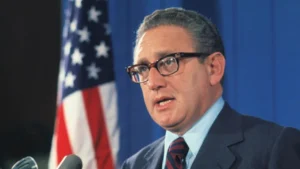
In an attempt to starve the communists of soldiers and supplies, Kissinger approved a campaign that resulted in the dropping of over two million tonnes of bombs on Cambodia, a neutral nation, as well as the deployment of thousands of ground troops. This campaign was approved while negotiations were ongoing with North Vietnam.
Millions of people were displaced and over 50,000 civilians perished in the raids.
Even after his death, resentment over a number of his policies persisted. The headlines “Henry Kissinger, War Criminal Beloved by America’s Ruling Class, Finally Dies” appeared in Rolling Stone’s obituary, while the left-leaning Huffpost splashed “The Beltway Butcher” over a picture of him on its home page.
Kissinger, though, dismissed criticism with contempt.
“That’s a reflection of their ignorance,” the statesman with a gravelly voice told CBS just before he turned 100 years old.
Together with Le Duc Tho of North Vietnam, who declined to accept, he was given the Nobel Peace Prize in 1973 for brokering the Paris Peace Accords, which put an end to US involvement in the Vietnam War.
Peace activists fiercely criticized the prize, which forced two Nobel committee members to step down.
